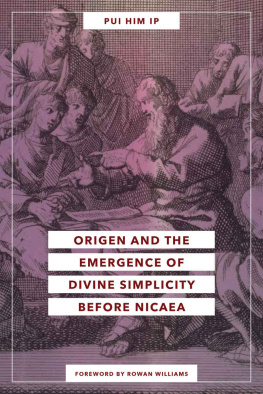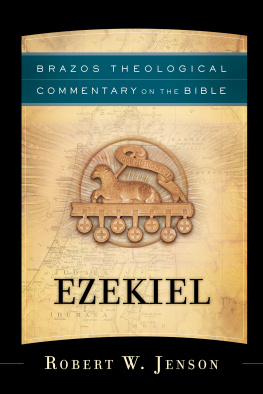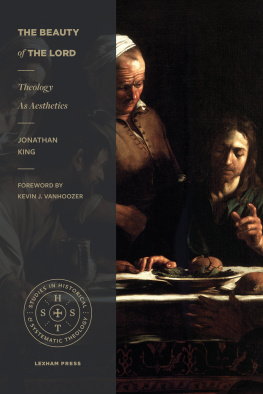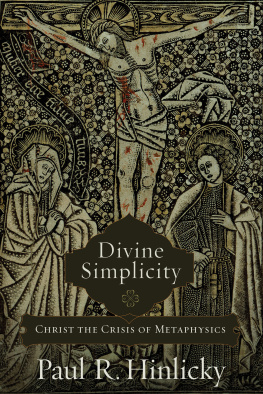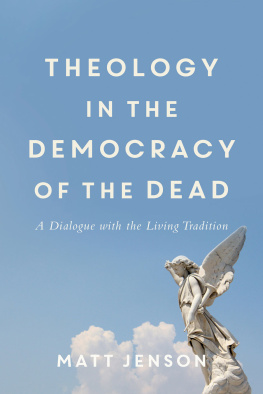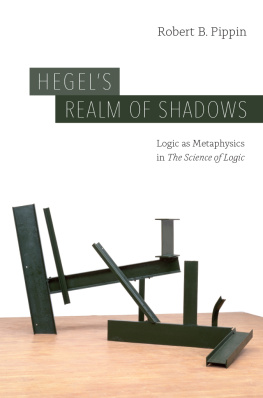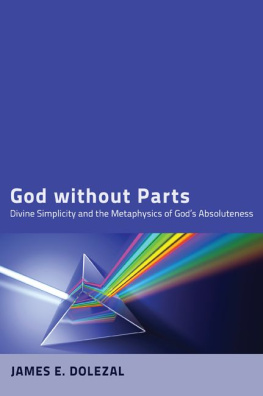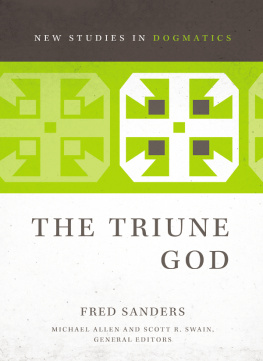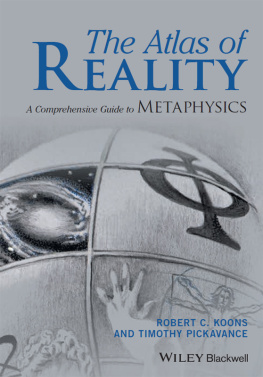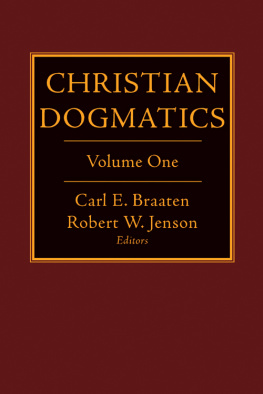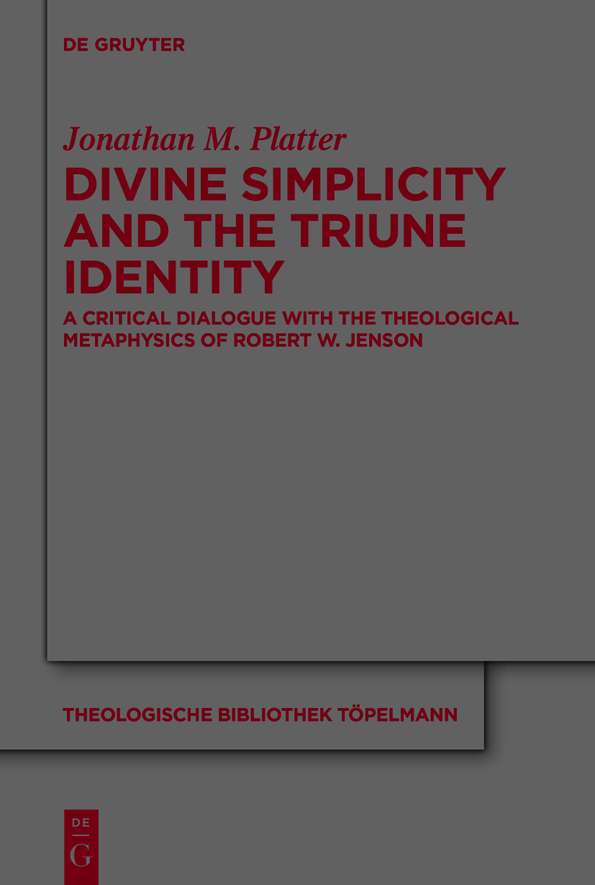Theologische Bibliothek Tpelmann
Edited by
Bruce McCormack
Friederike Nssel
Christoph Schwbel
Volume
ISBN 9783110739015
e-ISBN (PDF) 9783110735963
e-ISBN (EPUB) 9783110736014
Bibliographic information published by the Deutsche Nationalbibliothek
The Deutsche Nationalbibliothek lists this publication in the Deutsche Nationalbibliografie; detailed bibliographic data are available on the Internet at http://dnb.dnb.de.
2021 Walter de Gruyter GmbH, Berlin/Boston
Abbreviations
Athanasius
c. Ar.Orationes Contra Arianos (Orations Against the Arians). Edited by Philip Schaff and Henry Wace. Nicene and Post-Nicene Fathers of the Christian Church, Second Series, Vol. IV. Edinburgh: T&T Clark, 1892.
Augustine
Civ.De Civitate Dei (The City of God). Translated by William Babcock. 2 vols. New York: New City, 2013.
Trin.De Trinitate (The Trinity). Translated by Edmund Hill. Hyde Park, NY: New City, 1991.
De Rel.De Vera Religione (True Religion). Translated by Edmund Hill. In On Christian Belief, ed. Boniface Ramsey. Hyde Park, NY: New City, 2005.
En. Ps.Enarrationes in Psalmos (Expositions on the Psalms). Edited by Boniface Ramsey and John E. Rotelle. Translated by Maria Boulding. 6 vols. Hyde Park, NY: New City, 20002004.
In Ioh.In Iohannis Evangelium Tractatus (Homilies on the Gospel of John). Edited by Alan Fitzgerald. Translated by Edmund Hill. Hyde Park, NY: New City, 2009.
Conf.Confessiones (The Confessions). Translated by Maria Boulding. Hyde Park, NY: New City, 1997.
Latin quotations are from S. Aurelii Augustini Opera Omnia, ed. Franco Monteverde, online at http://augustinus.it.
Dionysius the Aereopagite
DNThe Divine Names. Translated by Colm Luibheid. In The Complete Works. Mahwah, NJ: Paulist, 1987.
MTThe Mystical Theology. Translated by Colm Luibheid. In The Complete Works. Mahwah, NJ: Paulist, 1987.
Gregory of Nyssa
Eun.Contra Eunomium IIII. Translated by Stuart George Hall. 3 vols, with Supporting Studies. Leiden: Brill, 20072018. Full details for each volume are provided in the bibliography, according to editors: Brugarolas, Karfkov et al, and Leemans et al, respectively.
All English quotations of Contra Eunomium are taken from Halls translation, though for ease of reference I also provide page numbers for NPNF2.
GNOGregorii Nysseni Opera. Edited by Wernerus Jaeger et al. Leiden: Brill, 1960.
In Eccl.Homilies on Ecclesiastes. Translated by Stuart George Hall and Rachel Moriarty. Berlin: Walter de Gruyter, 1993.
Cat.Catechetical Discourse. Translated by Ignatius Green. Yonkers, NY: St. Vladimirs Seminary Press, 2019.
Irenaeus of Lyons
AHAdversus Haereses (Against Heresies). Edited by Alexander Roberts and James Donaldson. Ante-Nicene Fathers of the Church, Vol. I. Edinburgh: T&T Clark, 1885
Robert W. Jenson
A&OAlpha and Omega: A Study in the Theology of Karl Barth. New York: Thomas Nelson & Sons, 1963.
ATAmericas Theologian: A Recommendation of Jonathan Edwards. Oxford: Oxford University Press, 1988.
CCCanon and Creed. Louisville: Westminster John Knox, 2010.
GaGGod After God: The God of the Past and the God of the Future, Seen in the Work of Karl Barth. New York: Bobbs-Merrill, 1969.
KNTHFThe Knowledge of Things Hoped For: The Sense of Theological Discourse. Oxford: Oxford University Press, 1969.
OTHOn Thinking the Human: Resolutions of Difficult Notions. Grand Rapids: Wm. B. Eerdmans, 2003.
RAIA Religion Against Itself. Richmond: John Knox, 1967.
S&PStory and Promise: A Brief Theology of the Gospel About Jesus. Philadelphia: Fortress, 1973.
STSystematic Theology, 2 Vols. Oxford: Oxford University Press, 19971999.
TIThe Triune Identity: God According to the Gospel. Philadelphia: Fortress, 1982.
UGUnbaptized God: The Basic Flaw in Ecumenical Theology. Minneapolis: Augsburg Fortress, 1992.
VWVisible Words: The Interpretation and Practice of Christian Sacraments. Philadelphia: Fortress, 1978.
Plotinus
Enn.The Enneads. Edited by Lloyd P. Gerson. Translated by George Boys-Stones, John M. Dillon, Lloyd P. Gerson, R. A. H. King, Andrew Smith, and James Wilberding. Cambridge: Cambridge University Press, 2018.
Enneads IVI: With an English Translation by A. H. Armstrong. 7 vols. Loeb Classical Library. Cambridge, MA: Harvard University Press, 19691988.
Thomas Aquinas
Comp.Compendium of Theology. Translated by Richard J. Regan. Oxford: Oxford University Press, 2009.
Pot.De potentia Dei (The Power of God). Translated by Richard J. Regan. Oxford: Oxford University Press, 2012.
In div. nom.In librum Beati Dionysii De divinis nominibus expositio (Commentary on Pseudo-Dionysius The Divine Names). In Corpus Thomisticum: S. Thomae de Aquino Opera Omnia, ed. Enrique Alarcn, online at www.corpusthomisticum.org, 2000.
ScGSumma Contra Gentiles. Edited by Joseph Kenny. Translated by Anton C. Pegis, James F. Anderson, Vernon J. Bourke, and Charles J. ONeil. Notre Dame: University of Notre Dame Press, 1975.
SThSumma Theologi. Edited by Thomas Gilby. Translated by The English Dominican Friars. Blackfriars Edition. 60 vols. London: Eyre & Spottiswoode, 19631981.
In Ioann.Super Evangelium S. Ioannis Lectura (Commentary on the Gospel of John). Edited by Daniel Keating and Matthew Levering. Translated by Fabian Larcher and James A. Weisheipl. 3 vols. Washington, DC: Catholic University of America Press, 2010.
Other
DSEnchiridion Symbolorum: A Compendium of Creeds, Definitions, and Declarations of the Catholic Church, Latin text online at http://catho.org/9.php?d=g1
NPNF2Nicene and Post-Nicene Fathers of the Christian Church, Second Series. 14 volumes. Edited by Philip Schaff and Henry Wace. Edinburgh: T&T Clark, 18861900.
Unless stated otherwise, quotations from the Bible are from the New Revised Standard Version.
Introduction
God is one being in three persons. So goes a standard description of the Christian doctrine of the Trinity. After several decades of vigorous defence and renewed attention to the affirmation of three persons, the sense of one being has come to a new point of critical reflection. The doctrine of divine simplicity, which holds that God has no parts, is one way to express Gods unity, and in the past it enjoyed near unanimity in Christian theology. In the previous generation of theologians, however, many voiced a desire to set the question of the unity of God after discussion of Gods threeness, explicitly rejecting what was seen as the scholastic over-emphasis on Gods oneness and simplicity to the detriment of the three persons.
The question of divine unity pertains to the core of Christian faith. On the one hand, we are pushed to ask how Father, Son, and Spirit are not three Gods but one. But on the other hand, the very possibility of the coherence of history and of humanity hinges on their coherence with realitys origin, persistence, and future. These are, as Robert Jenson never tired of pointing out, two sides of the same coin: does what happened in Jesus cohere with what happened at Israels exodus? Are these events of the same God? Is historys creator also its redeemer? Jesus prays in the garden, just before his death, that all who believe would be one, and he expresses the oneness of the Christian community by reference to and dependence on the oneness shared between himself and the Father: just as he and the Father are one, Jesus prays that all who believe would be one in them (Jn. 17:2023). May they also be in us The glory that you have given me I have given them, so that they may be one, as we are one, I in them and you in me, that they may become completely one (Jn. 17:21b23). St. Paul echoes Jesus prayer when in Romans 15:56 he connects the harmony within the church to Gods own steadfastness, a present harmony that anticipates the day when all will glorify God with one voice. We may not know the extent to which the unity of the Christian community displays the character of Gods unity, but Paul and Jesus both convey the conviction that Christian unity is derived from Gods unity and is manifest by virtue of Gods joining with humanity.


